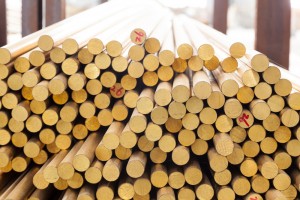Industrial rolled Brass
Main applications:
Electrical-Electronic: lugs, connectors, terminals, ferrules, electrical contacts, relays, plugs, pins, strip, terminals.
Automotive: Auto Accessories, trays for radiators, connectors, terminals
Mechanics: veneer mills, metal parts, connectors, white goods, eyelets.
Other sectors: bathroom accessories, flexible hoses, rosettes, handles, lamps, profiles, gold leaf, discs, sumps, beaded chains.
Features and formats:
EN CuZn33 CEN CW506L – OT 67
EN CuZn37 CEN CW508L – OT 63
Physical state: annealed, semi-annealed, hardened and extra hardened
Ribbons/Tapes
Slabs
Thicknesses from 0.20 to 3.00 mm. available
(non-standard sizes available on request)
Cutting ribbons and tapes (width from 6 to 1100 mm.)
Discs with diam. from 65 to 1000 mm.
Slabs and panels with sizes made to order
Brass Rods
Alloys commonly used for the bar used for the lathe (full and perforated bar) and for molding. Available with a round, square or hexagonal section with extruded and drawn plates, for uses ranging from plumbing and heating to mechanical parts for the electrical and automotive industry.
Main applications:
Hydrothermal
Industrial
EN CuZn39Pb3 CEN CW614N – OT 58
EN CuZn40Pb2 CEN CW617N – OT 58


